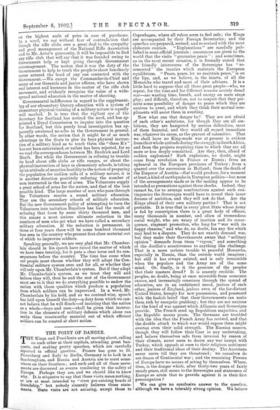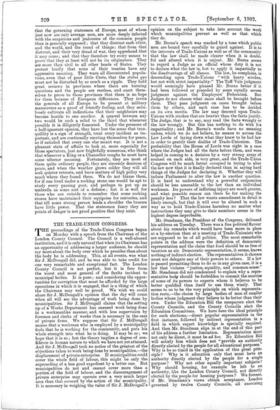THE POINT OF DANGER.
THE Kings and Presidents are all moving about, calling on each other at their capitals, attending great ban- quets, and making pretty speeches, which are carefully reported in official gazettes. France has gone to St. Petersburg and Italy to Berlin, Germany is to look in at Sandringham, and Russia and Austria are to meet some- where ou their frontiers ; and each and all of these move- ments are discussed as events conducing to the safety of Europe. Perhaps they are, and we should like to know why. It is etiquette to say that these visits mean nothing, or are at. most intended to rivet pre-existing bonds of friendship," but nobody sincerely believes those state- We can give no conclusive answer to the question, Copenhagen, where all rulers seem to feel safe ; the Kings are accompanied by their Foreign Secretaries ; and the speeches are prepared, revised, and re-revised with the most elaborate caution. " Explanations " are carefully pub- lished in semi-official journals ; assurances are given to the world that the visits " guarantee peace " ; and sometimes, as on the most recent occasion, it is formally stated that the friendly intercourse of the Sovereigns has " re- cemented" the treaties which maintain the European equilibrium. " Peace, peace, let us maintain peace," is on the lips, and, as we believe, in the hearts, of all the Monarchs who travel and most of their advisers. It is a little hard to suppose that all these great people—who, we repeat, for the time and for different reasons acutely dread war—are wasting time, breath, and energy on mere stage play; and difficult, therefore, not to suspect that they per- ceive some possibility of danger to peace which they are anxious to avert, and which they think their mutual com- pliments will assist them in averting.
Now what can that danger be? They are not afraid of each other's ambitions, for though they are all am- bitious, they are hampered by serious difficulties, most of them financial, and they would all regard immediate war, whatever its cause, as the gravest of calamities. That we shall have no King-made war at present is evident from their whole attitude during the struggle in SouthAfrica, and from the projects requiring time to which they are all more or less deeply committed. Are they, then, afraid of sudden explosions ? Such explosions, no doubt, might come from revolution in France or Russia; from an upheaval in the European provinces of Turkey ; from a quarrel over the succession in Holland ; from the death of the Emperor of Austria—that would produce, for a moment at least, a kind of earthquake in European politics—but none of the arrangements made or in the making appear to be intended as precautions against those shocks. Indeed, they cannot be, for to arrange combinations against such con- tingencies the Sovereigns would have to reveal their inner dreams of ambition, and they will not do that. Are the Kings afraid of their own military parties ? That is not probable. It is true that in every great State whose Army is fed by conscription there is a great body of officers, many thousands in number, and often of tremendous social weight, who are weary of inaction and its conse- quence, stagnant promotion, who long for " war with its happy chances," and who do, no doubt, fan any fire which may lead to a dispute. They do not exactly demand war, but they make their Governments aware that " military opinion " demands from them " vigour," and something of the duellist's sensitiveness to anything like challenge. That is a more serious trouble to peaceful Monarchs, especially in Russia, than the outside world imagines ; but still it has always existed, and is only irresistible when the populace and the Army are of the same mind. Or, finally, is it the pressure of the peoples that their masters dread? It is scarcely credible. The peoples, no doubt, being at once miserable from economic causes, and increasingly conscious through the spread of education, are in an embittered mood, jealous of each other, jealous of England, jealous even of the far-distant United States, hungry for new possessions, and possessed with the foolish belief that their Governments can make them rich by energetic grabbing ; but they are not anxious for the kind of war against which Alliances and Sovereigns provide. The French send up Republican majorities, and the Republic means peace. The Germans are troubled with the idea that the French Army has revived, and that the double attack to which war would expose them might overtax even their solid strength. The Russian masses, though they will follow their Czar in any undertaking, and believe themselves safe from invasion by reason of their climate, never seem to desire any war except with Turkey, which appeals at once to their religious sentiment and their traditional ideas of their destiny. The Austrians never move till they are threatened ; we ourselves do not dream of Continental war ; and the remaining Powers of Europe have no means of acting by themselves. Where, then, is the danger which, after thirty-two years of fairly steady peace, still seems to the Sovereigns and statesmen of Europe so acute that to provide against it is their first preoccupation ?
friendship," but nobody sincerely believes those state- We can give no conclusive answer to the question, that the governing statesmen of Europe, most of whom just now are only average men, are more deeply infected with the suspicions and jealousies of the common people than is generally supposed ; that they distrust each other, and the world, and the trend of things ; that from that distrust, and their very dread of war, they apprehend that it may come ; and that they therefore try every means to prove that they at least will not be its originators. They are more than civil to all other heads of States. They protest loudly that none of their treaties have any aggressive meaning. They warn all discontented popula- tions, even that of poor little Crete, that the status quo must not be disturbed by so much as a ripple. They hold great reviews in provinces where there are burning questions and the people are restless, and exert them- selves to prove to those provinces that there is no hope for them because of European differences. They invite the generals of all Europe to be present at military manoeuvres as a proof of friendly feeling, and they sedu- lously cultivate all indications that their neighbours may become hostile to one another. A quarrel between any two would be such a relief to the third that whenever possible it is diligently fomented. Under the pressure of a half-ignorant opinion, they have lost the sense that tran- quillity is a sign of strength, treat every incident as im- portant, and are continually exerting themselves for peace, as if satisfied that every one else meant war. It is not a pleasant state of affairs to look at, more especially for those spectators, just now frightfully numerous, who think that whenever a King or a Chancellor coughs he must have some ulterior meaning. Fortunately, they are most of them quite ordinary people, they are sincerely desirous of peace, and when the weather grows colder they will all seek quieter retreats, and leave matters of high policy very much where they found them. We do not blame them, for if one lived under a rocking stone one would be apt to study every passing gust, and perhaps to put up an umbrella as some sort of a defence ; but it is well for those who are outside to remember that some rocking stones have maintained their equipoise for centuries, and that till some strong person lends a shoulder the breezes have little power. That the statesmen fancy they see points of danger is not proof positive that they exist.







































 Previous page
Previous page